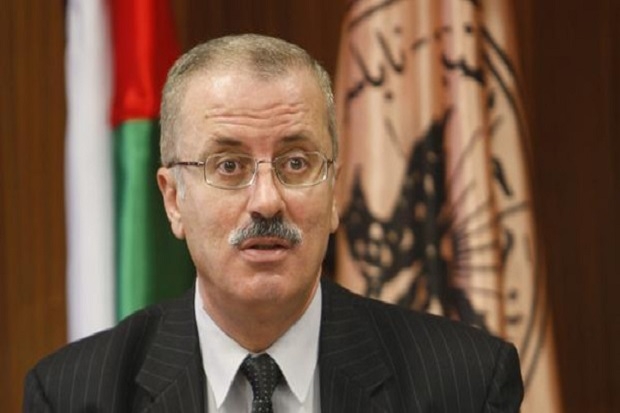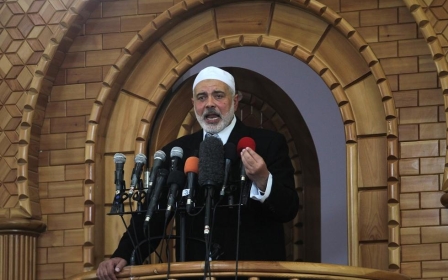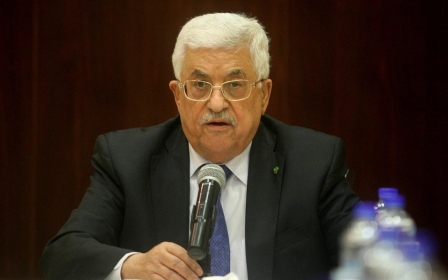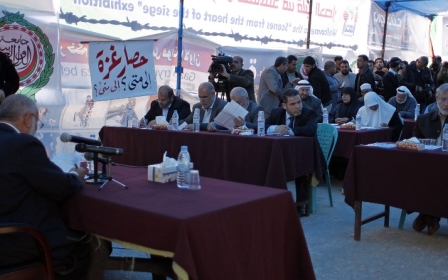Abbas denies reports Palestinian unity government has resigned

The future of the Palestinian unity government was mired in uncertainty on Wednesday after conflicting reports emerged that the current unity government has stepped down.
Following a day of controversy, widespread media reports stated on Wednesday afternoon that Prime Minister Rami Hamdallah had stepped down as head of the unity government and would now be tasked with forming a new cabinet.
The reports surfaced after Hamdallah left a meeting with President Mahmoud Abbas.
But Abbas’ office quickly denied the reports, saying that no decision had been taken as yet.
A spokesperson for the Palestinian presidency, Nabil Abu Radina, denied reports that Hamdallah had submitted his resignation, stressing that the PM would attend a meeting of the executive council next Monday to discuss “forming a national unity government”.
“Rami Hamdallah is still carrying out his duties,” Radina told Palestinian news agency Maan.
The controversy first surfaced on Tuesday when Fatah officials said that Abbas had announced that the unity government, which includes members of rival Palestinian faction Hamas, would be dissolved in the next 24 hours. No reason was given for the dissolution, but the current negotiations believed to be taking place between Hamas and Israel have been widely blamed for the rift.
A Palestine Liberation Organisation official told AFP on condition of anonymity that the current government of technocrats would likely be replaced by a government of politicians from the West Bank-based Fatah.
Hamas has continued to deny that it is locked in negotiations for a long-term ceasefire deal with Israel - senior Hamas member Mushir al-Masri told MEE earlier this week that no such negotiations were taking place.
However, almost all analysts and commentators contacted by MEE insist that the talks are happening, with some suggesting they could be in the final stages.
“We don’t know [when the deal is expected]. It could be hours, days or even longer,” Mkhaimar Abusada is Professor of Political Science at al-Azhar University in Gaza told MEE.
“But there was an indication by the military wing of Hamas that they have a picture of a clock in front of one of their prisoners serving multiple life sentences - he is pointing to the clock [as if to say] that the time is coming and the clock is ticking. There will be a prisoner exchange deal. If we get this, we could get a serious deal with a truce. We are very close to one.”
“A separate deal would be catastrophic for the PA and Abbas. Gaza will go its own way and become a separate entity. Abbas and the PLO (Palestine Liberation Organisation) can no longer claim that they represent Palestinians,” he added.
If Hamas is able to negotiate a separate peace deal the ramifications for Ramallah, the seat of power in the West Bank, could be huge. A separate deal for Hamas would further weaken the PA and take pressure away from Israel to negotiate a two-state solution. The unity deal was in part penned last April due to Israel’s insistence that it could not negotiate with a splintered Palestinian side and that it lacked a genuine partner for peace.
However, Israel suspended peace negotiations when Palestinian officials announced a unity government including both Fatah and Hamas, with Israeli Prime Minister Benjamin Netanyahu saying that Abbas had "said yes to terrorism and no to peace".
MEE's contributor in Gaza, Mohammed Omer, also stressed that Abbas’ concerns about a separate peace deal could have underpinned the announcement to end the unity deal.
“It could be that Abu Mazen [a common nickname for Abbas] is not happy with the deal that Hamas is trying to strike in terms of reconstruction and easing of the blockade, and that he worries Hamas is trying to create a three-tier Palestinian state. Or it could all be part of a bigger PA game. We will begin to understand more over the coming hours as more information begins to come out,” Omer said.
The initial announcement that the unity government would be dissolved was rejected by Hamas earlier on Wednesday.
"Hamas rejects any one-sided change in the government without the agreement of all parties," Hamas spokesman Sami Abu Zuhri told AFP on Wednesday morning.
"No one told us anything about any decision to change and no one consulted with us about any change in the unity government. Fatah acted on its own in all regards."
The spokesperson for the unity government on Tuesday evening also said he had not been informed of the decision ahead of time.
"We had a meeting today and we didn't discuss this issue," Ihab Bseiso, spokesman for the now-dissolved government, told AFP late on Tuesday.
Abusada said that he expected to see more of a reshuffle than a full-blown changing of the guard, with about 50 percent of the current ministers retaining their posts but figures from Gaza’s Hamas movement being effectively shut out.
“The PM will stay as PM, but the new government will involve only Fatah, the Palestine Liberation Organisation and other factions, and not Hamas,” Abusada said by phone from Gaza.
The expected reshuffle, which he says has been on the cards for several months, is likely to see the current ministers of education, finance and external affairs face the axe.
New MEE newsletter: Jerusalem Dispatch
Sign up to get the latest insights and analysis on Israel-Palestine, alongside Turkey Unpacked and other MEE newsletters
Middle East Eye delivers independent and unrivalled coverage and analysis of the Middle East, North Africa and beyond. To learn more about republishing this content and the associated fees, please fill out this form. More about MEE can be found here.




